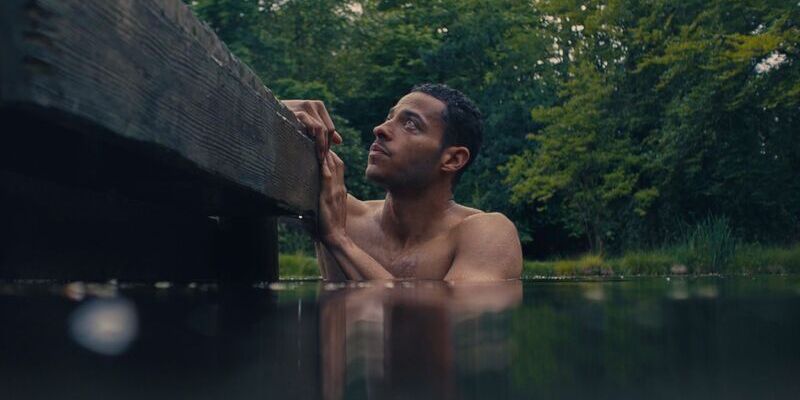
An aspiring writer uncovers intrigue when he accepts the role of tutor to
the son of his favourite author.
Review by
Eric Hillis
Directed by: Alice Troughton
Starring: Daryl McCormack, Richard E. Grant, Julie
Delpy, Stephen McMillan, Crispin Letts

Continental European thrillers have long drawn inspiration from
Britain. The German Krimis of the 1960s were mostly loose adaptations of
works by Edgar Wallace. The Italian Gialli of the '60s and '70s were
inspired by the popularity of classic English whodunits, reissued in
Italy in distinctively lurid yellow-bound paperbacks. French filmmakers
have always been drawn to adapting British crime fiction, much of which
is overlooked in its own country. It's very much a one-way street, as
British cinema rarely draws inspiration from the continent.
Alice Troughton's feature directorial debut
The Lesson is a British movie that does feel influenced by
Europe, specifically France. That's to say that at its best it resembles
the work of Ozon, Chabrol and Becker. You might even be fooled into
believing it's a remake of a French movie adapted from some forgotten
British novel. The French actress Julie Delpy is cast in just the
sort of role a French filmmaker might give to an English actress like
Charlotte Rampling or Kristin Scott-Thomas.

A lot of French thrillers don't really become thrillers until their
final acts, and the transition isn't always successful. They tend to
play better as character dramas, as battles of wits and psychological
powerplays, and they become less interesting when a corpse is eventually
discovered. That's an issue The Lesson shares with its
French cousins. For its first two thirds it's a gripping character
drama, a fascinating battle of wits and an intriguing psychological
powerplay. But then it becomes a thriller in its final act and much of
its good work is undone.
This is largely intentional on the part of Troughton and screenwriter
Alex MacKeith. Their film is broken into three distinct parts
marked by intertitles. Troughton and MacKeith want the viewer to be
acutely aware of their film's final act shift. It might be a case of
filmmakers being a little too clever for their own good.
At one point our protagonist, young writing tutor and aspiring novelist
Liam (Daryl McCormack), gives a critique of the long awaited
comeback novel of his literary hero, author JM Sinclair (Richard E. Grant). He offers that he loves the work, but that it's let down by a final
act that feels like it belongs to a different book. Such self-awareness
renders much of my critique null and void.

Liam finds himself in the company of Sinclair when he is hired by the
author's wife, French artist Helene (Delpy), to tutor their teenage son
Bertie (Stephen McMillan), who simply must get into Oxford's
English Literature programme. Whether Bertie actually wishes to follow
his father's footsteps is another matter however, and the boy reacts
sullenly to Liam's intrusion. There's also the metaphorical ghost of
Felix - Bertie's older brother, who drowned himself in the estate's pond
- hovering over proceedings.
Liam is initially ignored by Sinclair until he proves himself useful by
fixing his temperamental printer. The cantankerous author is also
impressed by Liam's ability to store entire volumes of literature in his
head. It's a skill he claims isn't a photographic memory but rather a
reaction to words. When the two men agree to read and offer mutual
critiques of their latest work, the stage is set for a potentially
fraught scenario. Liam is probably happy enough to learn how bad his
writing is, but Sinclair has only ever been told how great a writer he
is. This can't possibly end well.
Much of The Lesson plays out as a classic joust between a
person of power and an underling desperate to get some of that power for
themselves. If you've seen the likes of Damien Chazelle's
Whiplash or Alain Corneau's Love Crime (one
of the best French thrillers to cast the aforementioned Scott-Thomas as
a villainess), you'll be familiar with how this dance goes. Sinclair
almost seems to get off on subjecting Liam to a variety of
micro-aggressions and outright cruelty. The younger man largely soaks it
all up, possibly because like any writer he's dogged by insecurity, but
possibly because he has ulterior motives.

McCormack delivers a striking star-making turn that sees him turn on
the charm while also coming off as a little creepy. We're never quite
sure what to make of Liam, who might be the victim or the perpetrator
when the story ultimately reveals itself. Casting a black Irish actor,
and allowing him to keep his accent, adds an extra dimension, creating
an unspoken tension between this self-educated working class product of
two colonised cultures and the English and French toffs whose domain he
now finds himself in. Liam walks around the estate with his hands
constantly by his side, as though he's worried he might break something
he couldn't possibly pay for. I'm not sure if Troughton is actually
aware of this dynamic (McCormack's presence is likely a piece of
colourblind casting), but it's clear that McCormack certainly is, and is
likely drawing on his own experience of being thrust into the very white
and upper middle class world of the arts. Liam spends a lot of time
awkwardly standing outside rooms, but McCormack's ambiguous body
language leaves room for interpretation – is he waiting uncomfortably to
be invited in or snooping and gathering evidence?
A shame then that so much of this good work is undone by a final act
that takes the film into thriller territory. The shift never feels
organic, and like
Get Out, it relies heavily on a white antagonist clunkily explaining the plot
to the black lead. Yes, the shift is clearly intentional and all very
meta, but it could have been handled in more confidently cinematic
fashion.


